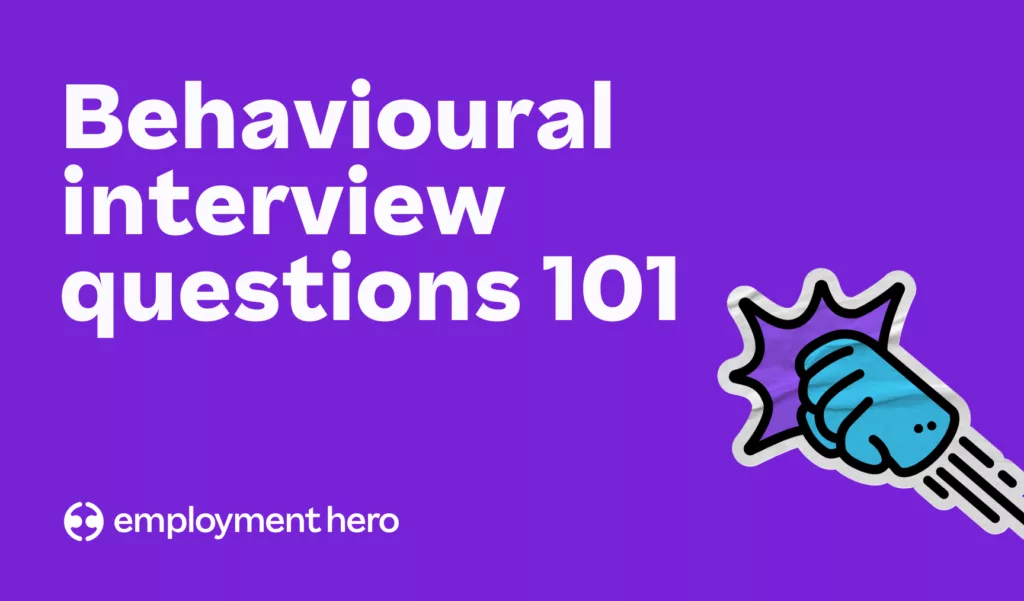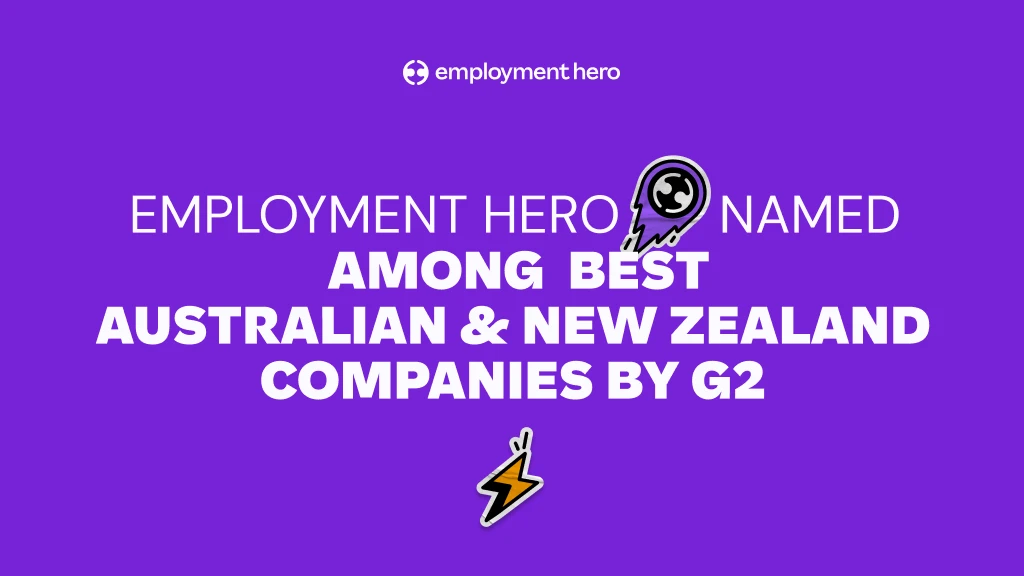The importance of behavioural interview questions for NZ employers
With intense competition for jobs in New Zealand, employers face a flood of applicants — but quantity doesn’t always equal quality. Behavioural interview questions can help you spot top talent, and here’s how.

Contents
Right now, competition for jobs in NZ is fiercer than ever – and employers are overwhelmed by the sheer number of candidates on the market. But if you’re hiring right now, you’ll know that quantity doesn’t always mean quality.
So, how do you identify the needle in the haystack?
Using carefully formulated behavioural interview questions is a great place to start, as they can help you gauge how a candidate has tackled real-life challenges in the past. That way, you’ll gain a clearer understanding of the candidate’s past behaviour – and how it may predict their future performance.
Ready to make better hiring decisions? Let’s get to it.
Why are behavioural interview questions important?
Unlike traditional job interviews, where candidates can give rehearsed answers, behavioural interviews focus on real-life examples. This method helps hiring managers understand how a candidate has behaved in practical situations, rather than how they think they might act.
Using competency-based interview questions, you can assess past behaviour as an indicator of future performance. This is particularly useful in industries where teamwork, decision-making, and adaptability are critical.
Benefits of behavioural interviews
- Provide deeper insights into a candidate’s problem-solving abilities.
- Minimise the risk of hiring someone based purely on personality.
- Help standardise the interview process, ensuring fairness across all applicants.
- Reduce turnover by selecting candidates who align with your company’s culture and values.
What are the most common behavioural interview questions?
To assess a range of skills, consider these popular behavioural interview questions:
- Tell me about a time you had to manage a difficult project. How did you ensure success?
- Give an example of a time you disagreed with a team member. How did you resolve it?
- Describe a situation where you had to meet a tight deadline. What steps did you take?
- Tell me about a mistake you made at work. How did you handle it?
- Can you give an example of a time you had to deal with an unhappy client or customer?
- Have you ever had to adapt to a major change in your workplace? How did you manage?
- Describe a time when you had to handle multiple projects at once. How did you prioritise?
How to ask great follow-up questions
Sometimes, a candidate’s initial answer won’t tell you everything you need to know. That’s where follow-up questions come in – they help you dig deeper and clarify the candidate’s level of involvement, decision-making, and impact.
Here are some useful follow-ups to try:
- What was your exact role in that project?
- What would you do differently if faced with a similar situation?
- How did your team respond to your actions?
- What did you learn from that experience?
- Can you give me more detail about the outcome?
These kinds of questions encourage candidates to expand on their stories and offer clearer, more useful insights – helping you make more informed hiring decisions.
How can employers gauge a candidate’s answers?
Not all responses carry the same weight. To evaluate a candidate effectively:
- Listen for specifics: vague answers might indicate a lack of experience.
- Assess their role in the situation: did they take initiative or rely on others?
- Check for results: what was the outcome of their actions?
- Watch for consistency: answers should align with their CV and job description.
Assessing answers for important past behaviours
When asking behavioural questions, look out for answers that demonstrate whether the candidate has the key traits and behaviours you’re looking for. Those might include:
- Problem-solving skills: can they think on their feet and resolve issues?
- Collaboration: do they work well with team members?
- Leadership skills: can they guide a team and take responsibility?
- Adaptability: how do they handle change or unexpected challenges?
- Communication skills: can they clearly explain their thoughts and ideas?
By asking the right behavioural questions, you gain insight into how a candidate might perform in your business.
Do their answers suggest future performance success?
You also want to look out for answers that demonstrate traits that may indicate their future performance success in your workplace. Those might include:
- Initiative and problem-solving
- Accountability for their actions
- The ability to stay calm under pressure
- The ability to juggle multiple deadlines
- Timeliness and efficiency
Can they demonstrate the ability to work well with others?
Great employees know how to work well with others. When interviewing, look out for answers that demonstrate the following:
- Strong communication and listening skills
- Willingness to compromise and collaborate
- A positive attitude towards teamwork
- Conflict resolution skills
Can they demonstrate leadership skills?
Even if the role isn’t a leadership position, leadership skills can be invaluable in many roles. Look for:
- The ability to take initiative
- Confidence in decision-making
- A history of mentoring or guiding others
- Examples of any projects or teams they’ve led previously
Example question: Can you give an example of a time you had to lead a project or team? What was the result?
How to structure your questions with the STAR method
The STAR method (Situation, Task, Action, Result) is a way of structuring your behavioural interview questions so that you get a clearer picture of the candidate’s typical behaviour at work.
- Situation: explain the context of the story
- Task: describe the challenge or responsibility faced
- Action: detail the steps taken to resolve the issue
- Result: share the outcome and what was learned
Asking behavioural interview questions in the STAR format is a simple technique to help you better assess a candidate’s suitability for a role.
Here’s a great example of a STAR-based question:
“Describe a time in your career when you faced a challenging situation. What action did you take to resolve the issue, and what was the outcome of that action?”
Framed in this way, the candidate is prompted to give specific examples pertaining to a specific experience they had – which will help you better assess how they may perform in your team.
Additional tips for effective interviews
The STAR technique and behavioural interview questions are just two ways to run effective interviews. If you’re hiring, here are a few extra things to consider:
- Tailor questions to the role: make sure the questions reflect the job description.
- Use a mix of questions: combine situational interview questions with competency-based ones.
- Make sure your interview questions comply with NZ HR compliance regulations.
- Involve multiple interviewers: Different perspectives can help make sure you make the most informed decision.
Find your needle in the haystack with Employment Hero
Behavioural interview questions are a great way to identify your perfect candidate during interviews. But that doesn’t make the initial recruitment process much easier, and you may still find yourself wading through hundreds of irrelevant CVs just to get a shortlist together.
That’s where our Employment Operating System comes in. With the Employment OS, you can do it all: advertise, recruit and hire through the SmartMatch tool, and onboard all within the same platform. Assign key workplace policies and training modules for digital acknowledgement in just a few clicks, and set up rosters and payroll in the same breath. Plus, access on-demand employment advice and support through our HR Advisory service – whenever you need it.
Ready to transform the way you hire? Book a demo today to get started.
Related Resources
-
 Read more: Employment Hero Named Among Best Australian & New Zealand Companies by G2
Read more: Employment Hero Named Among Best Australian & New Zealand Companies by G2Employment Hero Named Among Best Australian & New Zealand Companies by G2
Ranked #6 on G2’s 2026 Best Software Awards, officially a Top 10 software company in ANZ
-
 Read more: Employment Hero Named Among Best Australian & New Zealand Companies By G2
Read more: Employment Hero Named Among Best Australian & New Zealand Companies By G2Employment Hero Named Among Best Australian & New Zealand Companies By G2
Employment Hero has been ranked #6 on G2’s 2026 list of the Best Australian and New Zealand Companies.
-
 Read more: Product Update: January 2026
Read more: Product Update: January 2026Product Update: January 2026
Welcome to the January 2026 product update from the Employment Hero team. We’ve got lots to share around Custom Forms,…





















